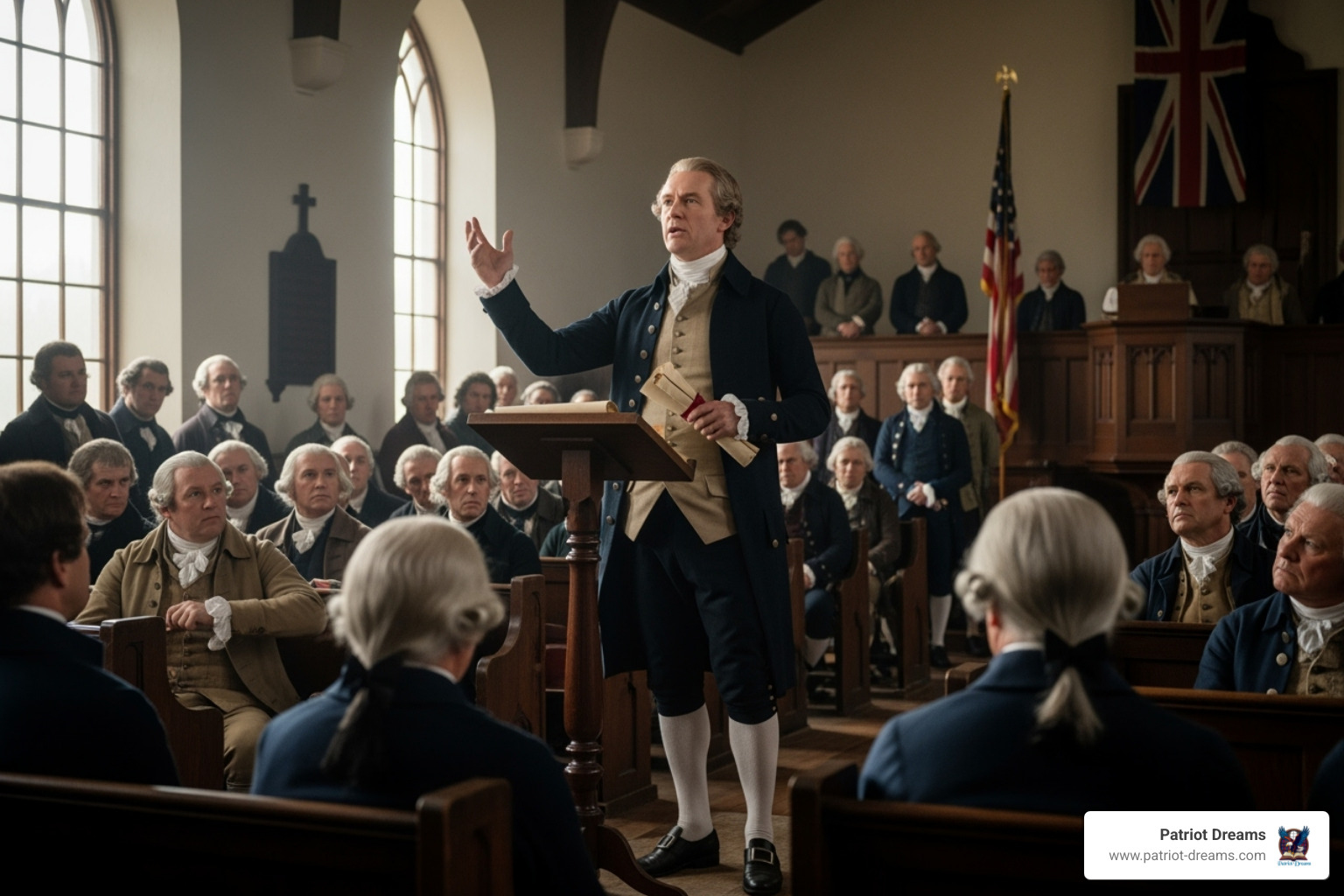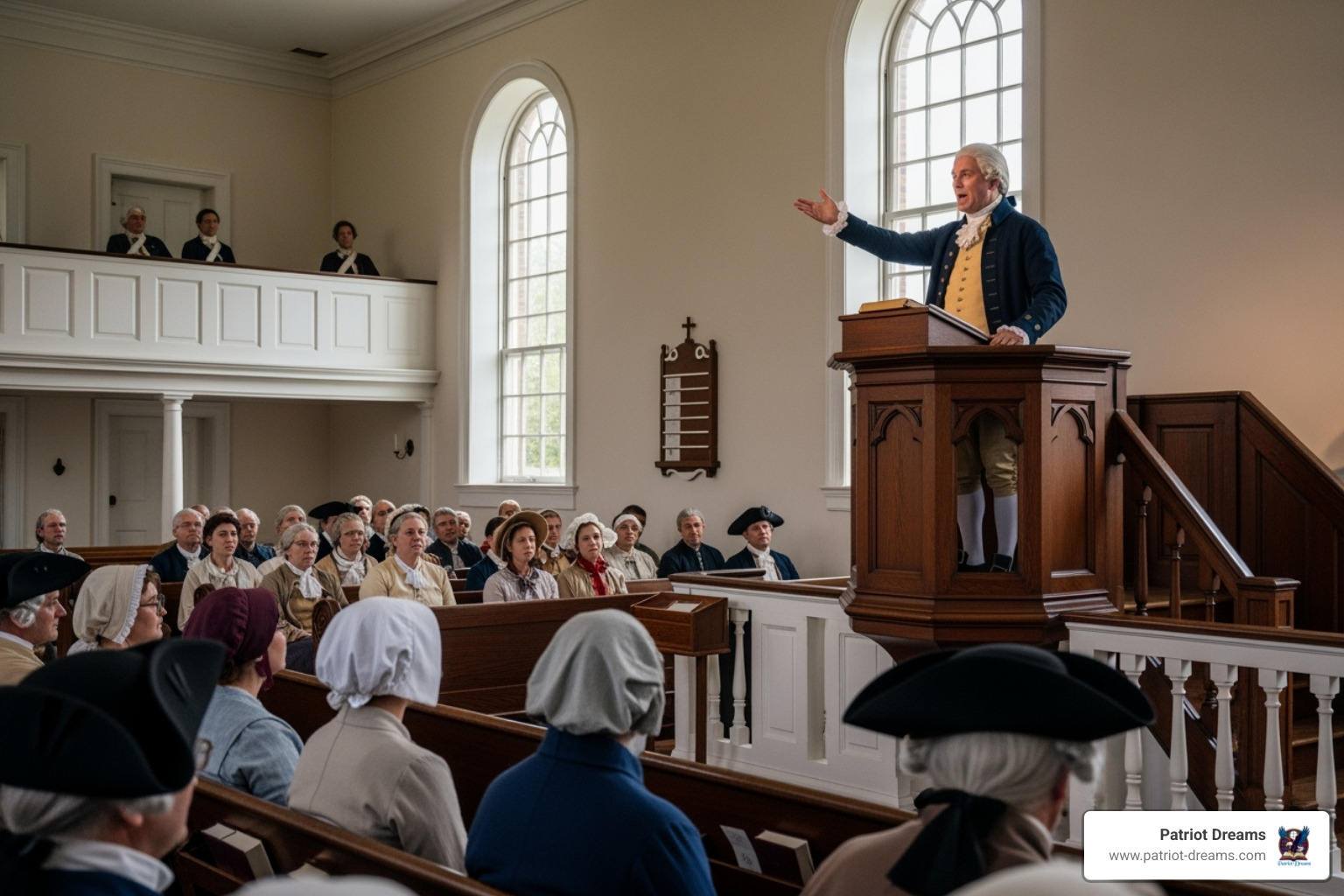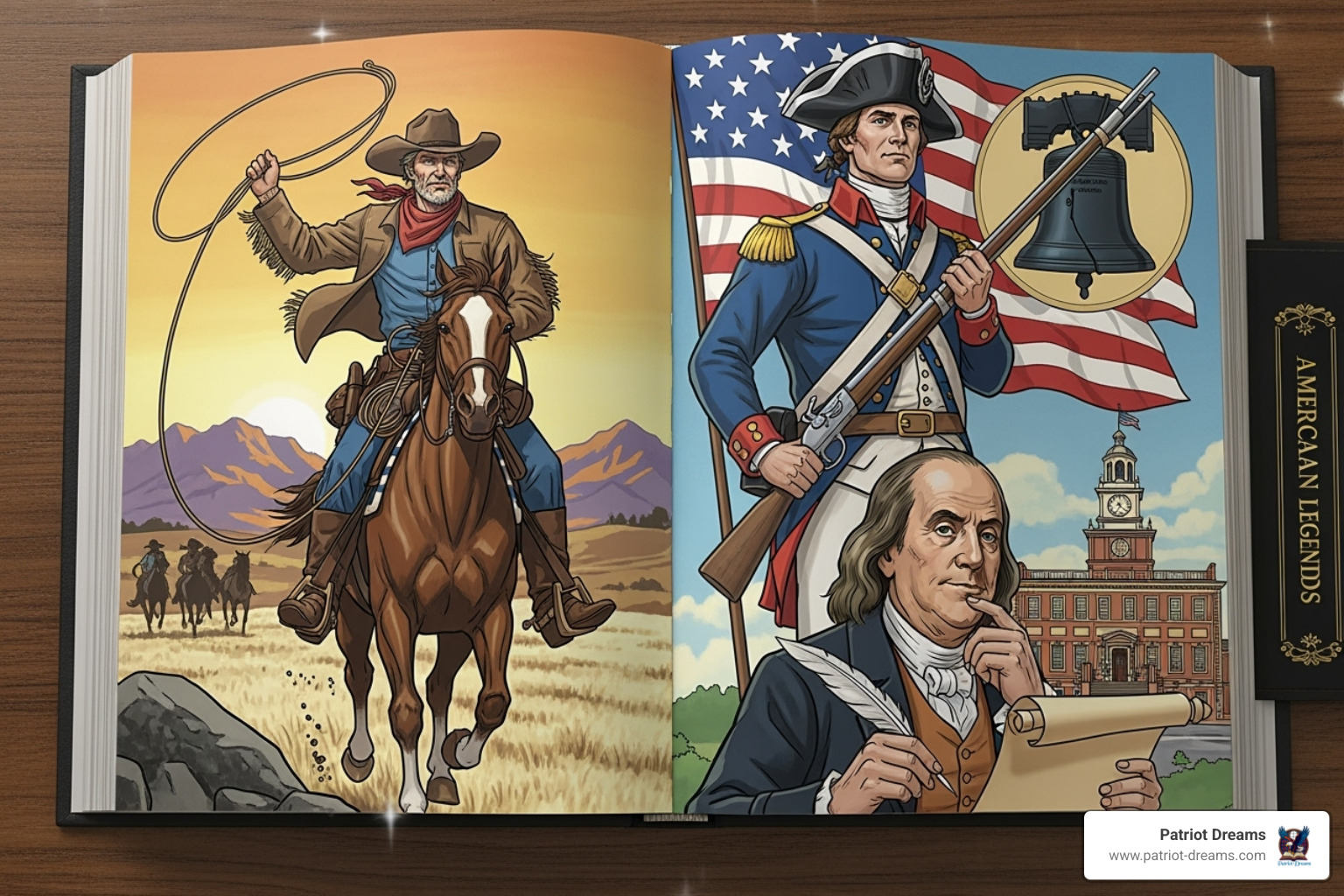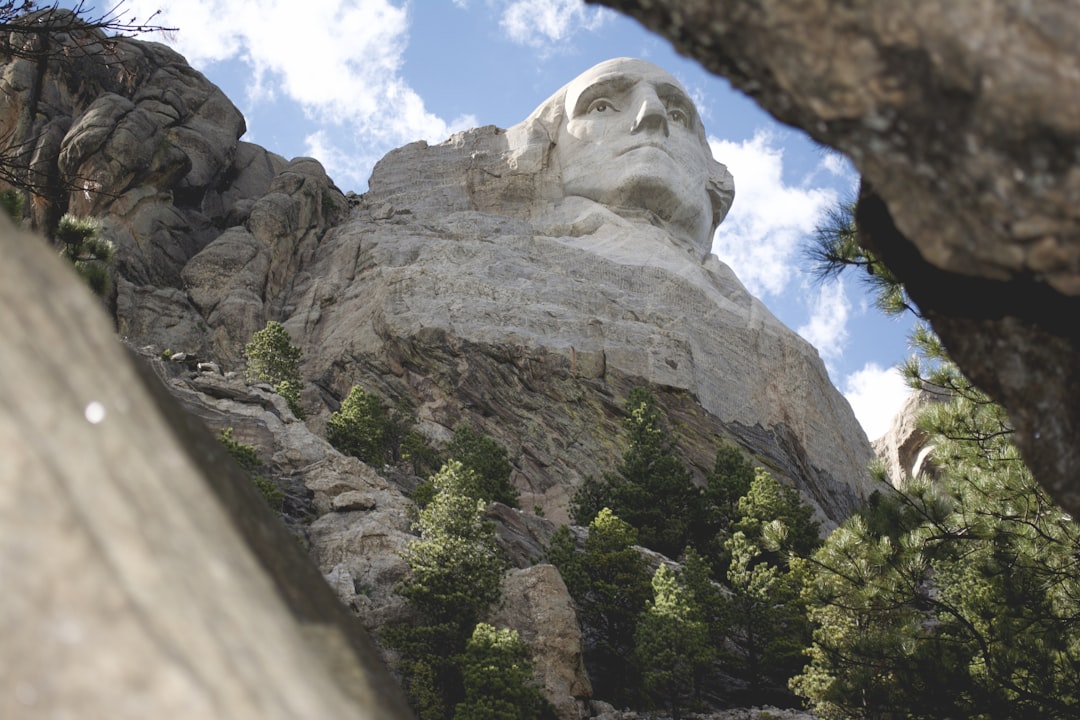Patrick Henry's Fiery Plea for Freedom


A Voice That Changed History
The Patrick Henry speech, delivered on March 23, 1775, is one of the most powerful moments in American history. When Patrick Henry rose to speak at St. John's Church in Richmond, Virginia, he gave voice to the hopes and fears of a people at a crossroads. His words that day—especially the famous closing line "Give me liberty or give me death!"—helped inspire a nation to believe in freedom.
Key Facts About Patrick Henry's Speech:
- When: March 23, 1775
- Where: St. John's Church, Richmond, Virginia
- Audience: Second Virginia Convention, including George Washington and Thomas Jefferson
- Purpose: To convince Virginia's leaders to prepare for war with Great Britain
- Impact: The convention voted to raise a militia, moving Virginia closer to revolution
- Famous Quote: "Give me liberty or give me death!"
That spring, the American colonies were caught between hoping for peace and the growing certainty of conflict. For years, they had patiently petitioned for their rights, hoping King George III would listen.
But Patrick Henry believed the time for waiting had passed and that his neighbors needed to hear the difficult truth. So, in a church filled with Virginia's most respected leaders, he stood to share what was in his heart.
The delegates faced a future-shaping question: Should Virginia prepare to defend itself or continue hoping for reconciliation? Henry's answer came from his soul. He spoke of chains and slavery, hope and courage, war and freedom, painting a picture so vivid and urgent that those who heard him would never forget.

A Fateful Day in Richmond: The Setting of the Speech
Picture a crisp spring morning in Richmond, Virginia—March 23, 1775. The air held a tension that made hearts beat faster. Change was coming to the American colonies, and everyone could feel it.
Virginia's leaders gathered for the Second Virginia Convention, not in their usual Williamsburg meeting place, but in St. John's Church in Richmond. The choice was deliberate: Royal Governor Dunmore wouldn't tolerate talk of colonial defense, so the delegates met away from his watchful eyes.
Inside St. John's Church, an extraordinary group gathered. George Washington was there, along with Thomas Jefferson and Peyton Randolph, the respected Speaker. They were more than politicians; they were neighbors, farmers, and fathers trying to protect their families and future, carrying the hopes of those they represented.
It was a remarkable gathering of the very people who would soon help birth a nation. Their courage and wisdom continue to inspire us. You can find More stories about Historical American Figures and the lives they led.
The Question of Freedom or Slavery
Inside the tense church, delegates faced a monumental choice. Many still hoped for peace, speaking for patience and one more attempt to reason with Britain. War was a terrible prospect, and these calls for caution were genuine.
But Patrick Henry saw it differently. For him, it was no longer about politics or taxes but a question of "freedom or slavery." He believed years of polite petitions had been ignored, met only with more restrictions. In his view, peaceful options were exhausted. It was a moment that called for the courage to speak a hard truth.
Why St. John's Church?
The choice of St. John's Church was meaningful. Beyond being a practical safe haven from Governor Dunmore, a church was a place for reflection and seeking wisdom. For delegates debating their very lives, it symbolized the moral and spiritual weight of their cause, suggesting their decision mattered beyond politics.
"The War is Inevitable": Unpacking the Patrick Henry Speech
When Patrick Henry rose to speak, a hush fell over the room. The delegates sensed this would be different from the cautious speeches they'd been hearing. Known for his passion, Henry was about to reach beyond rhetoric and touch the heart of everyone present.
Speaking without notes, his voice filled the church with growing emotion. His Patrick Henry speech was not just an argument but a heartfelt plea for his neighbors to see the difficult truth of their situation.

The Core Arguments for Liberty: A Summary of the Patrick Henry Speech
Henry began by gently acknowledging the patriotism of those hoping for peace. While respecting their views, he urged everyone to face the situation honestly, without comfortable illusions.
His message was direct: Hope, he argued, had become a dangerous delusion. The past decade of appeals to Britain showed only rejection and hostility. "I know of no way of judging of the future but by the past," he declared, and the past offered no comfort.
Henry recounted everything the colonists had tried: petitioning, protesting, and begging. Each peaceful attempt was met with contempt. What more could they do?
He then pointed to the British military buildup. Why were fleets and armies gathering on their shores? These forces, Henry insisted, were meant "to bind and rivet upon us those chains which the British ministry have been so long forging."
His words grew more urgent. The war wasn't coming—it had already begun. "The next gale that sweeps from the north will bring to our ears the clash of resounding arms!" he proclaimed, noting that colonists in Massachusetts already faced British troops.
To those who feared they were too weak to resist the British Empire, Henry offered encouragement. Three million people, united for liberty, were not weak. They had God on their side and a cause worth fighting for.
Then came the words that would echo through history: "Is life so dear, or peace so sweet, as to be purchased at the price of chains and slavery? Forbid it, Almighty God! I know not what course others may take; but as for me, give me liberty or give me death!"
Henry had laid out the choice in terms no one could misunderstand. His passionate plea continues to move us today, reminding us of the courage it took to stand up for freedom. You can Read more about the speech's legacy and find the complete text online: Full Text of Patrick Henry's "Give Me Liberty or Give Me Death" Speech.
The Power of a Voice: Henry's Rhetorical Genius
What made the Patrick Henry speech so powerful wasn't just what he said, but how he said it. Henry had a gift for making people feel what he felt and see what he saw.
He used rhetorical questions like, "Are fleets and armies necessary to a work of love and reconciliation?" to make the delegates active participants in his argument.
Henry painted pictures with his words. The "lamp of experience" made his argument feel wise. He also spoke of chains being forged and hearing their "clanking on the plains of Boston." These vivid metaphors helped everyone feel the danger.
His use of biblical references, like "the Majesty of Heaven," wove a moral thread through his arguments, suggesting the fight for liberty was righteous.
Henry also simplified complex situations into clear choices: Freedom or slavery. Action or chains. Liberty or death. These stark contrasts cut through confusion and made the path forward feel urgent.
Witnesses remembered his animated delivery, how his voice and gestures brought the speech to life. He understood that momentous decisions aren't based on logic alone; people need to feel the importance in their hearts. He made abstract ideas about rights feel immediate and personal. To explore more about how powerful communication shaped our nation, Discover more about American Cultural History.
"Give Me Liberty or Give Me Death!": The Speech's Powerful Impact
When Patrick Henry finished speaking, something remarkable happened in that small church. The room, which had been filled with cautious voices and careful deliberation, suddenly crackled with new energy. The delegates who had entered St. John's Church that morning uncertain and divided found themselves stirred by something deeper than politics—they felt it in their hearts. Henry's Patrick Henry speech had painted such a vivid picture of what was at stake that the path forward, though frightening, suddenly seemed clear.

A Resolution is Passed
The convention moved to vote on Henry's resolutions, which called for Virginia to prepare for its own defense by raising and organizing a militia. You can imagine the tension in that room as the delegates considered what this vote really meant. This wasn't just about military preparation—it was about crossing a line from which there could be no easy return.
The debate that followed was intense. Some delegates still hoped for reconciliation. Others saw Henry's wisdom and urgency. But when the votes were counted, Henry's resolution passed, though by a narrow margin. It was enough. Virginia had made its choice.
This single vote changed everything. It was one of the first times an American colony formally committed itself to preparing for armed resistance against Great Britain. Virginia's decision would inspire other colonies to follow suit, each one adding its voice to a growing chorus for liberty. The vote that day wasn't just a political decision—it was a collective act of courage, a moment when ordinary people chose an uncertain future over comfortable chains.
A Rallying Cry for a Nation
The phrase "Give me liberty or give me death!" didn't stay within those church walls for long. It spread like wildfire through the colonies, carried by those who had heard it and by those who heard it retold. The words captured something essential about the American spirit—a willingness to risk everything for freedom.
Throughout the Revolutionary War, soldiers marched into battle with those words echoing in their minds. Families who sent their sons and fathers to fight found strength in Henry's conviction. The phrase became more than just a memorable line from a speech—it became a symbol of what the American Revolution meant at its core.
But the power of those words didn't end with American independence. They've continued to inspire people throughout history, from freedom movements in other countries to anyone facing their own moment of decision. The phrase has been quoted in France, in Greece, and in countless struggles for human rights around the world. It speaks to something universal in the human heart—the deep desire to live freely, to make our own choices, to determine our own destiny.
For us today, Henry's words remind us of the extraordinary courage of those who came before us. They faced an uncertain future with nothing but their conviction and each other. They chose hope over fear, action over comfort, and freedom over security. That's a legacy worth remembering and honoring. We're grateful to be able to share these stories of courage and conviction with you. Learn more stories about the American Revolution's spirit and the remarkable people who shaped our nation's founding.
The Echoes of Liberty: The Speech Through the Ages
The Patrick Henry speech isn't just something we read about in dusty history books. It's a living, breathing part of who we are as Americans. Even though Patrick Henry spoke those powerful words on March 23, 1775—a quarter of a millennium ago—they still echo in our hearts today, reminding us of the courage it takes to stand up for what we believe in.

A Story Passed Down: The Question of the Exact Patrick Henry Speech
Here's something truly fascinating about history: we don't actually have Patrick Henry's exact words written down from that day. He spoke from his heart, without any notes, and nobody thought to write it all down at the time. The version of the Patrick Henry speech that we read today was pieced together more than forty years later by William Wirt, Henry's first biographer. Wirt was just three years old when the speech happened, so he couldn't have heard it himself. Instead, he talked to people who had been there, including Thomas Jefferson, and reconstructed what Henry said based on their memories.
This means historians today sometimes wonder about the exact wording, especially that famous closing line. Did Henry really say "Give me liberty or give me death" in exactly those words? History may have polished the language a bit, perhaps making it more dramatic than the original. But here's what we know for certain: everyone who was there that day agreed that Henry's speech was absolutely powerful. It moved them. It changed minds. It inspired action.
Sometimes the exact words matter less than the courage behind them. The spirit of what Henry said—that freedom is worth any sacrifice—is what truly matters. That message came through loud and clear to the delegates in St. John's Church, and it still comes through to us today. It's a beautiful reminder that passion and conviction can change the world, even when the precise phrasing might be lost to time.
Commemorating a Call for Freedom
The story of Patrick Henry's brave stand continues to be celebrated in wonderful ways. Right there at Historic St. John's Church in Richmond, Virginia, where it all happened, you can experience annual reenactments that bring that momentous day back to life. Watching actors in colonial dress recreate the convention, you can almost feel the tension in the room, the weight of the decision before those delegates. These aren't just performances—they're a way for us to connect with our shared past and remember the real people who made difficult choices for our future.
The 250th anniversary on March 23, 2025, was particularly special. Virginia marked this milestone with thoughtful commemorations through the VA250 initiative. Historians like Ken Burns and speakers like Carly Fiorina helped us reflect on what Henry's words meant then and what they mean now. Newspapers across the country, including the Washington Post and the Richmond Times-Dispatch, published thoughtful pieces exploring the timeless question of liberty and what we're willing to sacrifice for it.
What makes these commemorations so meaningful is that they're not just about looking backward. They're about carrying forward the values that Patrick Henry championed—the belief that freedom matters, that courage counts, and that ordinary people can do extraordinary things when they stand together. At Patriot Dreams, we believe these stories have the power to inspire us and unite us, reminding us of the best of who we can be. For more inspiring tales of American courage and determination, explore more American Stories in the Patriot Dreams app.
Frequently Asked Questions about Patrick Henry's Speech
Did Patrick Henry really say "Give me liberty or give me death!"?
This is one of the most common questions we hear, and it's a wonderful one to explore. The truth is, we don't have a recording or an official transcript from that day in 1775. Patrick Henry spoke from his heart, without notes, and in that era, nobody was taking down every word verbatim. The version of the Patrick Henry speech that we know and cherish today was actually reconstructed by William Wirt, Henry's first biographer, more than forty years after the speech was delivered—and eighteen years after Henry himself had passed away.
Now, you might wonder: does that mean the famous line isn't real? Not at all. Those who were actually in St. John's Church that day—people like Thomas Jefferson—confirmed that Henry's words were incredibly powerful and moving. They remembered the spirit, the passion, and the unmistakable message: that freedom was worth any sacrifice. So while we can't be absolutely certain of the exact phrasing, the sentiment behind "Give me liberty or give me death!" truly captures what Henry conveyed that day. It's a beautiful reminder that sometimes the feeling behind words—the courage and conviction—matters even more than their precise articulation.
Why was the speech so important?
The Patrick Henry speech came at a moment when Virginia's leaders stood at a crossroads, genuinely uncertain about which path to take. Many of them still hoped for peace with Great Britain. They wanted to believe that things could be worked out through patience and negotiation. It's a sentiment we can all understand—nobody wants conflict.
But Henry's words changed everything. His passionate appeal helped the delegates see their situation clearly, without illusion. He reminded them that years of peaceful attempts had been ignored or met with more restrictions. He painted such a vivid picture of the choice before them—freedom or subjugation—that they could no longer sit still and hope for the best.
The speech succeeded in swaying the Second Virginia Convention to pass a resolution to prepare Virginia's militia for defense. This was a pivotal decision that moved the colony from cautious waiting to active preparation. It inspired other colonies to follow Virginia's lead, helping to unite the American cause. The speech brought people together at a crucial moment, encouraging unity and courage when both were desperately needed. It marked a genuine turning point, changing abstract concerns about rights into concrete action for a brighter future.
Who was in the audience for the speech?
If you could have been in St. John's Church that day, you would have found yourself among some of the most remarkable individuals in American history. The audience wasn't just a gathering of local officials—it was a collection of Virginia's finest leaders, many of whom would go on to shape our nation in profound ways.
George Washington was there, the man who would soon lead the Continental Army and become our first president. Thomas Jefferson sat among the delegates, taking in Henry's words—the same Jefferson who would write the Declaration of Independence just over a year later. Peyton Randolph, the respected Speaker of the House of Burgesses and the first President of the Continental Congress, was present as well.
These weren't just powerful figures; they were thoughtful, principled individuals who genuinely cared about their neighbors and their future. They came to the convention with open minds and willing hearts, ready to wrestle with the most important question of their time. When Henry spoke, they listened with the weight of responsibility on their shoulders. His heartfelt words moved them deeply, helping to chart a course that would change the world. It's truly inspiring to think about how these dedicated people came together in that small church to make such a momentous decision.
A Legacy of Courage
When we reflect on the Patrick Henry speech and that fateful day in St. John's Church, we're reminded of something truly profound: the power of a single voice, spoken with courage and conviction, can change the course of history. Patrick Henry didn't have an army behind him that day. He didn't have wealth or royal connections. What he had was belief—belief in freedom, belief in his neighbors, and belief that the truth, however difficult, needed to be spoken.
His words that March afternoon in 1775 became more than just a speech. They became a guide of hope, a rallying cry, and a reminder of what the American spirit is truly about. It's about resilience when times are hard. It's about standing together when the path forward seems uncertain. And it's about having the courage to protect what we hold dear, even when doing so requires great sacrifice.
At Patriot Dreams, we treasure these moments from our shared past. We believe that the story of Patrick Henry—and countless other Americans who showed everyday courage—isn't just something to memorize in a history book. These stories are gifts passed down through generations, reminding us of the values that unite us: kindness toward our neighbors, perseverance through challenges, and a deep commitment to liberty and justice for all.
When Henry declared "Give me liberty or give me death," he was speaking not just for himself, but for everyone in that room, and for generations yet to come. His words continue to echo today, inspiring us to cherish the freedoms we enjoy and to remember that these liberties were won through the courage of ordinary people who chose to do extraordinary things.
We're honored to share these stories with you—stories of courage, hope, and the enduring American spirit. They remind us that we're all part of something bigger, a continuing journey toward a brighter, freer future that we build together, one story at a time.
We invite you to find more heartwarming tales that celebrate the very best of America. Explore more inspiring stories on our blog.
Join the Patriot Dreams Community
Download the app today and start your journey through American history and personal legacy.

Explore Our Latest Insights
Dive into stories that shape our American legacy.




